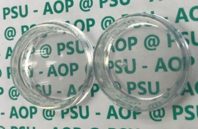Acrylic and polycarbonate lenses appear in all sorts of optical applications, but the inorganic antireflection (AR) coatings that improve the performance of glass lenses are difficult to apply to plastic optical surfaces. Researchers at a U.S. university have developed a method for coating these plastic lenses with a fluoropolymer that adheres well and even makes the surfaces seemingly invisible to a viewer.
In addition to improving optical components, the AR coatings could enhance the efficiency of solar panels that use plastic lenses to concentrate sunlight. Other possible uses include reducing reflections in security camera domes and virtual-reality gear.
The secret to making this coating, according to Noel “Chris” Giebink and his team at Pennsylvania State University’s electrical engineering department, is to deposit two types of molecules onto the plastic lens surfaces, not just one. While evaporating the amorphous fluoropolymer onto the substrate, the researchers add in a “sacrificial” molecule—a type of organic semiconductor.

 (585) 768-2513
(585) 768-2513

